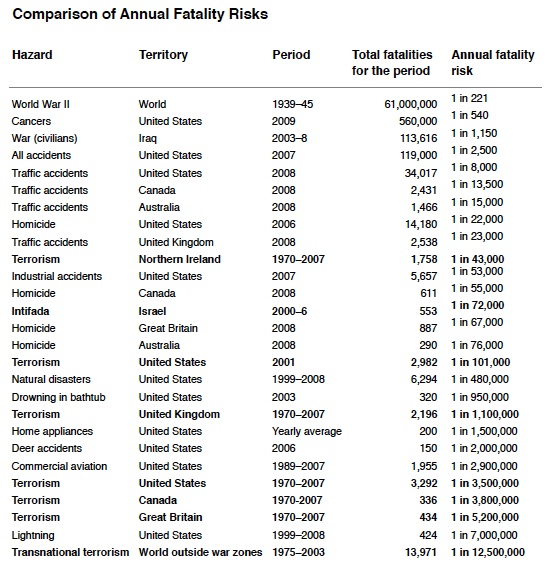The other concern, I guess, is to have all that information in the hands of people who are so paranoid that, even though the nation is physically isolated, has friendly neighbors, and has never had a war on its soil other than against itself, it spends 5 times more than any other nation and about 40% of all nations on military. I hope they believe they have bigger fish to fry, but the budget does not seem to reflect that out at the moment.While the War of 1812 was partially fought on our soil, I otherwise don't disagree with Jim on this. Terrorism poses a relatively slight risk to our well-being. In their 2010 report for Foreign Affairs, John Mueller and Mark G Stewart constructed a comparative analysis of terrorism compared to other potential causes of death as follows:
As we can see, the results show that the average American on an annual basis is more likely to be killed by a home appliance, drowning in a bathtub, or in a car accident involving a deer, than they are to be killed in a terrorist attack. This is to say nothing of the threat of ordinary violent crime, which poses a greater threat by several orders of magnitude than that of terrorist violence. Traffic accidents pose an even greater risk. As far as I know, there's no government surviellance of deer or home appliances. And, apparently, we as a nation are willing to little to stem gun violence.
Unfortunately, Al-Qaeda and the other terrorists have won this aspect of the conflict. They know too well that they pose no real threat to the existence of the United States, and that they will never, for example, occupy any American territory. So, their strategy is to create enough fear to generate an exaggerated response in the hopes that we will end up tripping over our own feet somehow. In this, they have been entirely successful.
Even today, Americans are totally comfortable with sacrificing privacy for security, as shown in the latest national survey by the Pew Research Center and The Washington Post, conducted June 6-9:
Even on the more specific questions, people opted for security:
We live in a democracy and, if the majority of Americans are more worried about terrorism than their appliances going haywire or deer running about, then that's where the money's going to go. Perhaps, its not the NSA that is the threat but the American public.
(Of course, there is always the correlation vs. causation concern. There are those, I'm sure, who would argue that the reason that terrorism appears to pose such a slight threat is because we have neutralized it by our supposed exaggerated response. "People sleep peacefully in their beds at night only because rough men stand ready to do violence on their behalf." Ascribed, probably incorrectly, to George Orwell. This is a question for another day.)



3 comments:
Of course, the question that haunts us is: what was Snowden's secret?
I couldn't help but admire the first chart of "Comparison of Annual Fatality Risks". I greatly admired the "20 Century Death" graph, but for all the months of visual arts and information talent and technology that must have gone into that wonderful graph, I found this simple list more informative and easier to access. It also answers more questions. Should we be spending more money on protection from deer or protection from terrorists? Is spending our money helping? (Compare Canada with U.S.) Was WW II really as bad as it seemed for the world? Would you want to live in Iraq from during the Bush administration or in Northern Ireland during any administration in the last 40 years? Are we taking too many baths?
The prolbem with the the "20 Century Death" graph is that it didn't really show what you claimed it did: namely the irrationality of our fears. Because it just took all the deaths over 100 years and sorted them out into categories really didn't show risk. The were no ratios set up between total deaths and population. Nor was it limited by time. The chart showed lots of intersting things -- like the ideological death tolls -- but not risk.
Post a Comment